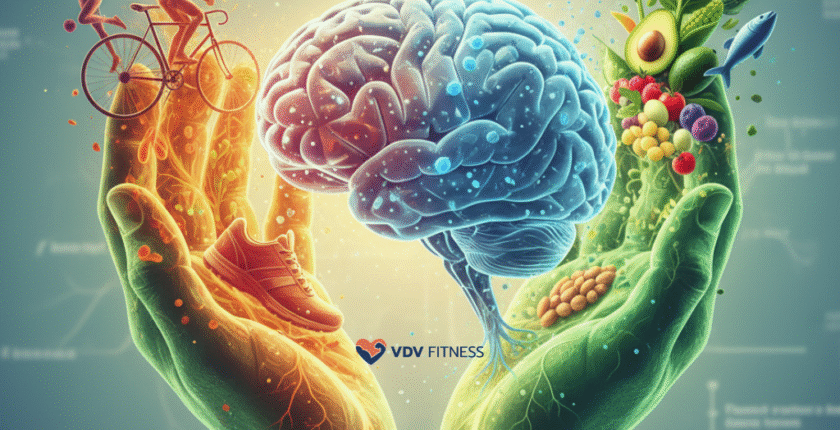By visiting our site, you agree to our privacy policy regarding cookies, tracking statistics, etc.
Blog
The Role of Exercise and Nutrition in Alzheimer’s Prevention:
- October 2, 2025
- Posted by: VDV fitness team
- Category: Exercise Health Support Mindfulness & Fitness Mindset & Motivation Nutrition & Diet

Exercise and Nutrition: Key Allies in Delaying Alzheimer’s Disease
Alzheimer’s disease (AD) is a progressive brain disorder that causes memory loss, cognitive decline, and behavioural changes. While genetics play a role, lifestyle choices can significantly impact AD management and potentially delay its onset. Regular exercise and a nutritious diet are key in this journey.
Recent studies in the Scientific American Journal, including one with 1,200 Finnish individuals aged 60-77, have highlighted the benefits of nutritional counselling, structured exercise, and brain training, showing significant improvements in cognition and memory over a two-year period.
The Power of Exercise
According to Scientific Health Journals, regular aerobic exercise—like walking, running, and swimming—can reduce AD risk by up to 45%. Exercise enhances brain health by improving blood flow and stimulating the production of brain-derived neurotrophic factor (BDNF), a vital component for memory, particularly in the hippocampus. It also acts as a natural anti-inflammatory and helps clear amyloid plaques related to AD.
Moderate-intensity exercise enhances physical health, mitochondrial function, and vascular health, maintaining cognitive function and delaying neural degeneration. Combining aerobic activities with strength training can significantly improve cognitive performance.
Nutrition’s Role
Diet significantly impacts AD risk through inflammation and oxidative stress. Diets rich in antioxidants, omega-3 fatty acids, and anti-inflammatory foods create a healthy brain environment. The Mediterranean diet, with fruits, vegetables, whole grains, nuts, and olive oil, shows promise in slowing cognitive decline. Additionally, ketogenic diets may reduce neuroinflammation.
Combining Diet and Exercise
A combination of a wholesome diet and regular exercise creates a synergistic effect that boosts brain protection. This duo enhances nutrient absorption and supports crucial metabolic processes for brain health.
Practical Steps for Brain Health
Aim for at least 150 minutes of moderate aerobic exercise weekly, paired with strength and balance training. Embrace a Mediterranean-style diet rich in plant-based foods and healthy fats, while minimising processed foods and added sugars. Staying socially and cognitively connected further complements these efforts.
Though, according to the Scientific American Journal, there’s no particular receptor to examine what works and what doesn’t. Instead, exercise might lead to better blood flow in the brain. It might affect cerebral metabolism. It could affect insulin levels or increase oxygen flow. All these factors have been linked to the development of Alzheimer’s in some way. It’s also difficult to investigate the timing and “dosage” of exercise.
However, all we can do is find a way to enjoy exercise and balanced nutrition with love, rather than sacrificing them, for long-term health and mobility, and for multiple health benefits.
